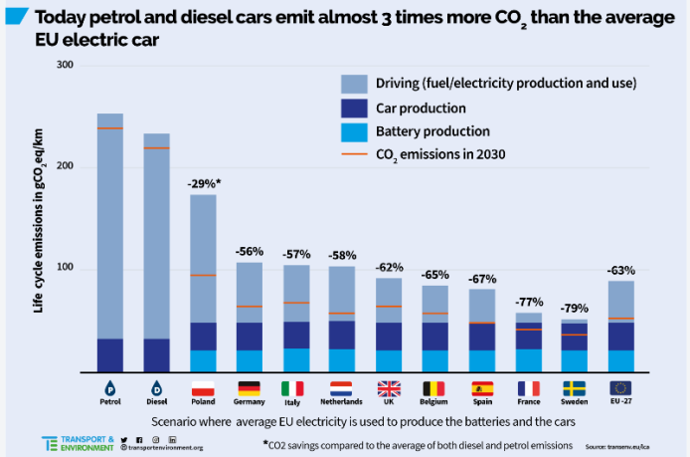T&E finds BEV environmental footprint significantly lower than ICEs
T&E finds BEV environmental footprint significantly lower than ICEs (electrive)
- According to Transport & Environment (T&E), EVs in Europe are responsible for almost three times less CO2 over their life cycle than a comparable petrol or diesel car.
- According to their published calculation tool, even in the worst case scenario (an EV in Poland with a battery made in China) an EV emits 22% less CO2 than a comparable diesel car and 28% less than a gasoline car.
- The tool on the website is currently only designed for battery electric cars and uses an average value of the real emissions of the ten best-selling models per segment in 2018 to calculate CO2 emissions (including the emissions from production).

Analysis and Comments
- See here for the tool. Quite a few interesting studies out on this topic recently:
- A study by the universities of Cambridge, Exeter and Nijmegen found that driving an EV is currently more climate-friendly than driving a gasoline car in 95% of the world.
- However, as most studies focus primarily on CO2 emissions and leave other pollutants out of the equation, a recent more holistic evaluation by a research team from the Environmental Campus Birkenfeld at Trier University of Applied Sciences is well worth a look. See here for the study results and here for the related news article.
- For this study, the research team dismantled a VW Caddy, analysed it, and rebuilt it with an electric drive to conduct their comparative lifecycle assessment (LCA) based on conditions that come as close as possible to the real world.
- The evaluation shows how important the energy source is for battery production, but also for charging during the lifecycle. Notably, the study finds that producing batteries with photovoltaic electricity instead of Chinese coal-based electricity decreases climate impacts of battery production by 69%.
- In summary (and perhaps due to the real-world approach used in this study), the two EVs built and analysed (SMART and VW Caddy) turned out to be very advantageous with respect to climate change impacts, particularly when all “green” options were used (green electricity charging, battery production under green electricity supply, battery second use), while the lifecycle impacts of diesel cars were shown to be significantly higher than previously described in LCA modelling.

You don't want to miss a Crypto news?
Follow me on Twitter or Facebook
Use Brave browser, one that respects your privacy and pays you to browse the internet !

Come try out a great blockchain game: Splinterlands


0
0
0.000
0 comments